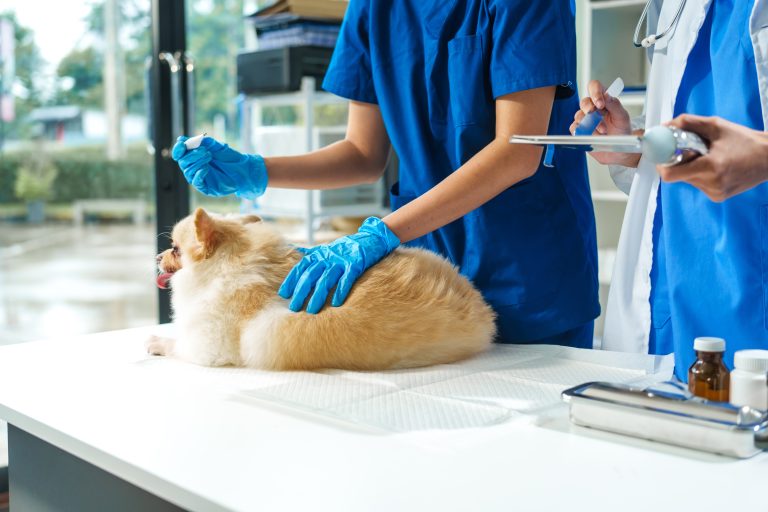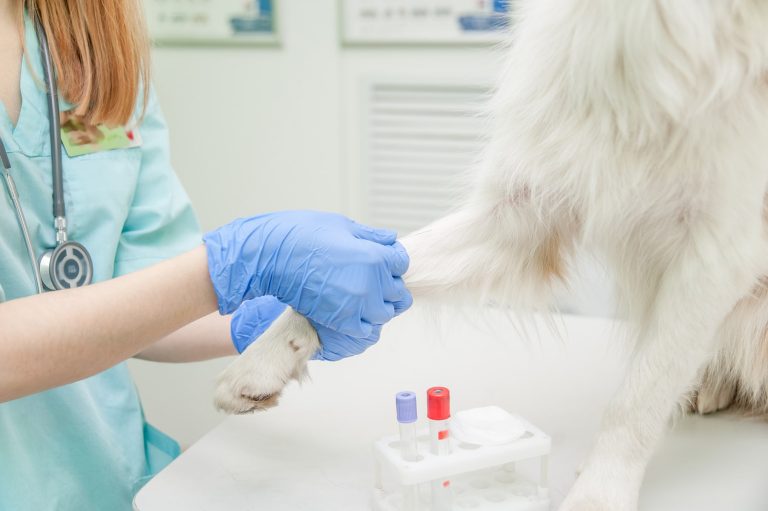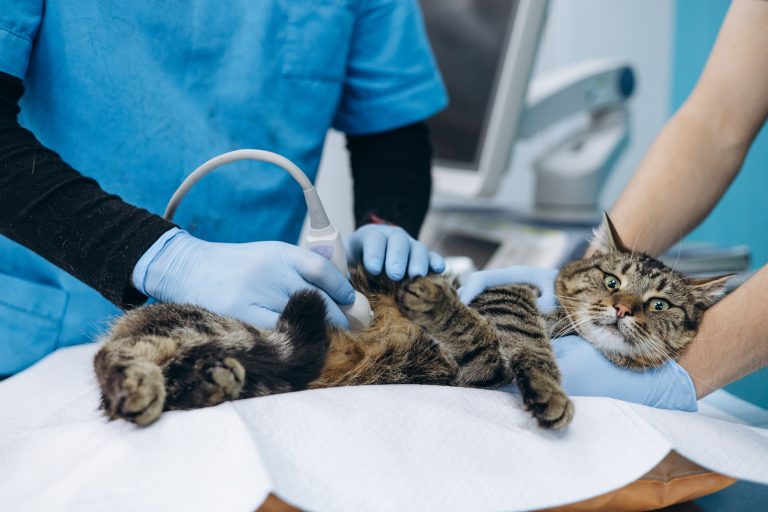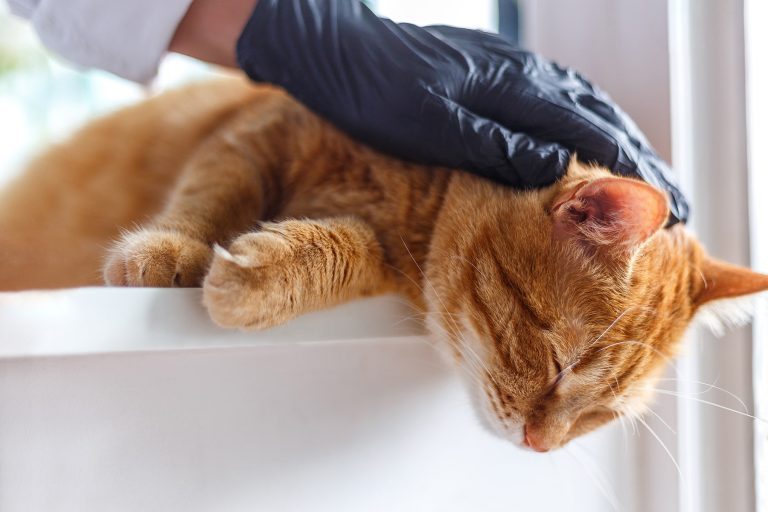This Article Will Address:
- How to stay calm and when to call your emergency vet
- Immediate first-aid actions you can take during a pet emergency
- Essential items for your pet’s first-aid kit
- What (not) to give your dog for pain relief
- How to safely manage an upset stomach
- Signs that your dog may have an intestinal obstruction
- When repeated vomiting becomes a serious concern
- Safe, simple ways to ease a dog’s cough at home
- What to bring with you to the emergency clinic
- Tips to prevent common pet emergencies
- Why calling ahead matters
- Why pet owners choose Summit Veterinary Urgent Care
Stay Calm and Call the Emergency Vet
Emergencies are overwhelming, but your calm response can help stabilize your pet and make treatment faster and safer. If you suspect something is wrong, call Summit Veterinary Urgent Care right away. Our trained team uses a triage system to assess your pet’s condition and prepare for your arrival. No appointment is necessary; walk-ins are welcome, and our clinic is ready to treat urgent cases immediately.
What to Do First: Basic First Aid Steps for Pet Emergencies
- Assess your pet’s condition. Look for breathing trouble, visible injuries, vomiting, or signs of pain.
- Stop active bleeding. Apply firm pressure using gauze or a clean cloth.
- Minimize movement. If you suspect broken bones or spinal trauma, gently slide your pet onto a firm surface like a towel or board. Avoid lifting them directly.
- Prepare for transport. Keep your pet warm and restrained for safety. If possible, have someone drive while you provide support on the way to the clinic.
What Should Be in Your Pet First Aid Kit?
Having a well-stocked first aid kit can make a big difference in those critical first moments. Recommended items include:
- Gauze, adhesive tape, and non-stick bandages
- Digital thermometer
- Saline solution for rinsing wounds or eyes
- Hydrogen peroxide (3%), only to be used under veterinary guidance
- Scissors, tweezers, gloves, towels
- A flashlight, slip lead or leash, and muzzle
- Emergency contact information for local veterinary clinics
What Can I Give My Dog for Pain Until I Get to the Vet?
The short answer is: nothing without veterinary guidance. Never give your dog human medications like ibuprofen, acetaminophen, or aspirin. These can be toxic and lead to kidney failure, ulcers, or worse. If your pet appears to be in pain, the best step is to call Summit for direction. Once here, we’ll use safe, species-specific pain management tailored to your pet’s weight and condition.
How to Settle a Dog’s Stomach
If your dog is experiencing mild gastrointestinal upset:
- Temporarily withhold food for up to 12 hours (less for puppies and small breeds)
- Offer small amounts of water or ice chips to prevent dehydration
- Do not administer any over-the-counter medications or natural remedies without professional advice
If vomiting continues or your pet shows signs of lethargy or discomfort, seek veterinary care right away.
How to Tell If a Dog Has an Obstruction
A gastrointestinal blockage can become life-threatening very quickly. Look for:
- Repeated vomiting
- Bloating or abdominal swelling
- Difficulty defecating or posturing to defecate with no results
- Whining, pacing, or pawing at the mouth
- Refusal to eat or drink
If you notice any of these signs, bring your pet to Summit immediately for evaluation and possible imaging.
How Many Times Should a Dog Throw Up Before Going to the Vet?
Occasional vomiting may not require urgent care. However, you should bring your dog in if:
- They vomit more than once in a 24-hour period
- Vomit contains blood or a dark, coffee-ground appearance
- They show signs of lethargy, dehydration, or abdominal pain
Vomiting can be a symptom of poisoning, infection, or a blockage, early intervention is key.
What Home Remedy Can I Give My Dog for Coughing?
If your dog has a mild cough:
- Use a humidifier or allow them to sit in a steamy bathroom
- Keep them calm and avoid pressure on their neck with a harness instead of a collar
- Avoid giving honey, essential oils, or human cough medications, these can be harmful or ineffective
Persistent coughing could indicate kennel cough, pneumonia, or another serious condition. A veterinary exam is the safest way to identify the cause.
What Should I Bring to the Emergency Vet?
To help our team quickly assess and treat your pet, bring:
- Any current medications or supplements
- Samples of vomit, stool, or material your pet ingested
- Recent medical history or vaccination records
- A leash or secure carrier
- A list of observed symptoms and when they started
Preventing Common Pet Emergencies at Home
Prevention can go a long way in keeping your pet safe. Here are a few everyday tips:
- Store toxic foods (like chocolate, grapes, and onions) out of reach
- Keep sharp objects, medications, and household cleaners locked away
- Use pet-proof trash cans
- Supervise your pet outdoors and check your yard for escape routes
A few minor adjustments around the house can prevent many emergency visits.
When Should I Call Ahead?
Calling us before you arrive gives our team time to prepare for critical situations. If your pet is in distress, that call could help us administer urgent pet care within seconds of your arrival. Save (256) 937-7776 in your phone now so you’re prepared in case of emergency.
Why Choose Summit Veterinary Urgent Care in Decatur, AL?
Pet owners across North Alabama trust Summit because:
- We care for dogs, cats, small mammals, goats, and more—all without referral
- Our fear-free approach keeps pets as calm and comfortable as possible
- We accept walk-ins during urgent-care hours, no appointment needed
- Our clinic is led by Dr. Lauren Smith, an experienced and compassionate emergency vet who treats every pet as if they were her own
We serve families from Decatur, Priceville, Huntsville, and beyond with dedication and heart.
Trust Summit Veterinary Urgent Care in Decatur, AL for Pet Emergencies
In the moments that matter most, Summit Veterinary Urgent Care is here for you. Whether it’s late at night or during the weekend, you can count on us to provide fast, compassionate emergency care for your pets. Follow the steps outlined above to stabilize your pet and then bring them to our clinic in Decatur, AL. Call our urgent pet care office for immediate assistance.






